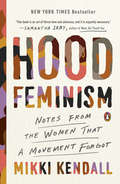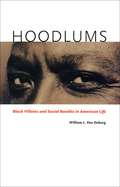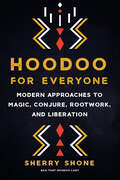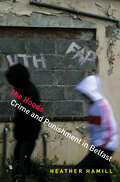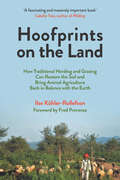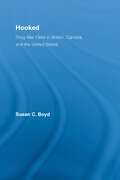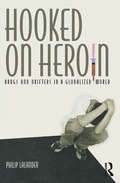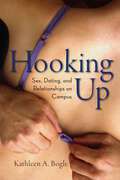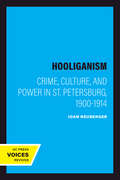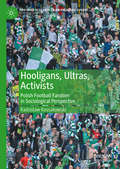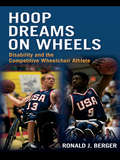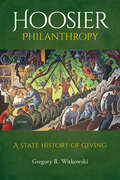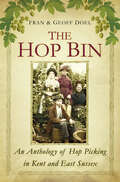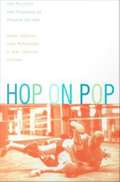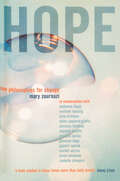- Table View
- List View
Hood Feminism: Notes from the Women That a Movement Forgot
by Mikki KendallA potent and electrifying critique of today's feminist movement announcing a fresh new voice in Black feminism <P><P>Today's feminist movement has a glaring blind spot, and paradoxically, it is women. Mainstream feminists rarely talk about meeting basic needs as a feminist issue, argues Mikki Kendall, but food insecurity, access to quality education, safe neighborhoods, a living wage, and medical care are all feminist issues. <P><P>All too often, however, the focus is not on basic survival for the many, but on increasing privilege for the few. That feminists refuse to prioritize these issues has only exacerbated the age-old problem of both internecine discord and women who rebuff at carrying the title. Moreover, prominent white feminists broadly suffer from their own myopia with regard to how things like race, class, sexual orientation, and ability intersect with gender. <P><P>How can we stand in solidarity as a movement, Kendall asks, when there is the distinct likelihood that some women are oppressing others? In her searing collection of essays, Mikki Kendall takes aim at the legitimacy of the modern feminist movement arguing that it has chronically failed to address the needs of all but a few women. <P><P>Drawing on her own experiences with hunger, violence, and hypersexualization, along with incisive commentary on politics, pop culture, the stigma of mental health, and more, Hood Feminism delivers an irrefutable indictment of a movement in flux. An unforgettable debut, Kendall has written a ferocious clarion call to all would-be feminists to live out the true mandate of the movement in thought and in deed. <P><P><b>A New York Times Bestseller</b>
Hood Wellness: Tales of Communal Care from People Who Drowned on Dry Land
by Tamela J. Gordon&“A funny, thought-provoking, and profound memoir about the intersection of Blackness and health. Gordon&’s vision of a more just future feels both inspiring and possible.&” — Kirkus Starred ReviewWhat does self-care look like when struggling to make ends meet, living with a disability, or navigating intersectional marginalization? How can you prioritize well-being while divesting from systems built to destroy you? The answer: Hood Wellness, a groundbreaking exploration that challenges the oppressive systems deeply rooted in health and wellness industries in the United States. In a world where self-care is critical to survival, Gordon offers a revolutionary perspective that celebrates individuals' unique privileges, challenges, and desires. By defying the norms of multi-billion-dollar industries, Hood Wellness illuminates the possibilities that emerge when we prioritize well-being while divesting from harmful structures. Hood Wellness is also a deep exploration of people forced to overcome harrowing circumstances with little more than communal support and the will to get well. From terminal illness and police violence to embracing gender identity in a society that's attacking trans and queer rights, each story reflects America's extreme political, racial, and gender climates. Gordon challenges everything we think we know about wellness by calling out the wellness industry's inability to include those outside the margins of white, heteronormative identities. She lays plain that self-care as we know it is mostly just surface-level "cute," and communal care is the call-to-action that America needs. Drawing on elements of memoir, self-help, humor, critical race theory, and devastatingly honest storytelling, Gordon guides readers on a transformative journey toward a new paradigm of wellness. This compelling book serves as a beacon, empowering individuals to cultivate resilience and self-love in today's world. As Gordon shares her personal odyssey, she intertwines the stories of others, revealing her profound discoveries, triumphs, and passions related to self-care. Hood Wellness introduces readers to an inclusive and accessible self-care primer and an approach to well-being that holds the potential to bring about profound change in their lives.
Hoodlum Movies: Seriality and the Outlaw Biker Film Cycle, 1966-1972
by Peter StanfieldFrom The Wild Angels in 1966 until its conclusion in 1972, the cycle of outlaw motorcycle films contained forty-odd formulaic examples. All but one were made by independent companies that specialized in producing exploitation movies for drive-ins, neighborhood theaters, and rundown inner city theaters. <P><P>Despised by critics, but welcomed by exhibitors denied first-run films, these cheaply and quickly produced movies were made to appeal to audiences of mobile youths. The films are repetitive, formulaic, and eminently forgettable, but there is a story to tell about all of the above, and it is one worth hearing. <P><P>Hoodlum Movies is not only about the films, its focus is on why and how these films were made, who they were made for, and how the cycle developed through the second half of the 1960s and came to a shuddering halt in 1972.
Hoodlums: Black Villains and Social Bandits in American Life
by William L. Van DeburgMartin Luther King Jr. Malcolm X. Muhammad Ali. When you think of African American history, you think of its heroes individuals endowed with courage and strength who are celebrated for their bold exploits and nobility of purpose. But what of black "villains"? Villains, just as much as heroes, have helped define the black experience. Ranging from black slaveholders and frontier outlaws to serial killers and gangsta rappers, "Hoodlums" examines the pivotal role of black villains in American society and popular culture. Here, William L. Van Deburg offers the most extensive treatment to date of the black badman and the challenges that this figure has posed for race relations in America. He first explores the evolution of this problematic racial stereotype in the literature of the early Republic documents in which the enslavement of African Americans was justified through exegetical claims. Van Deburg then probes antebellum slave laws, minstrel shows, and the works of proslavery polemicists to consider how whites conceptualized blacks as members of an inferior and dangerous race. Turning to key works by blacks themselves, from the writings of Frederick Douglass and W. E. B. Du Bois to classic blaxploitation films like "Black Caesar" and "The Mack," Van Deburg demonstrates how African Americans have combated such negative stereotypes and reconceptualized the idea of the badman through stories of social bandits controversial individuals vilified by whites for their proclivity toward evil, but revered in the black community as necessarily insurgent and revolutionary. Ultimately, Van Deburg brings his story up-to-date with discussions of prison and hip-hop culture, urban rioting, gang warfare, and black-on-black crime. What results is a work of remarkable virtuosity a nuanced history that calls for both whites and blacks to rethink received wisdom on the nature and prevalence of black villainy. "
Hoodoo for Everyone: Modern Approaches to Magic, Conjure, Rootwork, and Liberation
by Sherry ShoneA beginner&’s guide to an inclusive Hoodoo practice--history, spellwork, folklore, and herbsHoodoo is a folklore tradition that was created by and for enslaved African Americans in the southern United States. And before there were honey jars, red brick dust, and everything else you may associate with Hoodoo, there was the need to be free.This is not the #kitchenwitch Hoodoo you&’ve seen on social: it&’s magic for those who seek liberation and healing, for those who have been hurt, misunderstood, or cast aside. This is Hoodoo, updated: history, foundations, spellwork, and spiritual guidance made accessible to everyone, inclusive of all backgrounds and genders.Written with three guiding Hoodoo tenets--Intention, Faith, and Direction--in mind, Hoodoo for Everyone offers everything you need to know about the practice: rituals, conjure, rootwork, divination, herbs, plants, and ancestor work.Shone&’s modern Hoodoo also goes in-depth into discussions of gender, religion, and cultural appropriation. She answers the questions: • Is Hoodoo the same as Voodoo, Lucumi, or Santeria? • How do I connect to an ancestor if I don&’t know my family&’s history? • Is Hoodoo accessible to queer folks? • Can I practice Hoodoo even if I&’m agnostic or Christian? • How can I practice Hoodoo respectfully and with sensitivity? With spells and verses organized by topic and a list of spices, herbs, and spellwork objects, Hoodoo for Everyone is for all readers called to Hoodoo, new and experienced alike. For anyone seeking a natural spiritual practice, a connection to their history, or a deeper connection to non-judgmental life energy, Shone offers a comprehensive guide to manifesting deliverance through Hoodoo magic.
The Hoods: Crime and Punishment in Belfast
by Heather HamillA distinctive feature of the conflict in Northern Ireland over the past forty years has been the way Catholic and Protestant paramilitaries have policed their own communities. This has mainly involved the violent punishment of petty criminals involved in joyriding and other types of antisocial behavior. Between 1973 and 2007, more than 5,000 nonmilitary shootings and assaults were attributed to paramilitaries punishing their own people. But despite the risk of severe punishment, young petty offenders--known locally as "hoods"--continue to offend, creating a puzzle for the rational theory of criminal deterrence. Why do hoods behave in ways that invite violent punishment? In The Hoods, Heather Hamill explains why this informal system of policing and punishment developed and endured and why such harsh punishments as beatings, "kneecappings," and exile have not stopped hoods from offending. Drawing on a variety of sources, including interviews with perpetrators and victims of this violence, the book argues that the hoods' risky offending may amount to a game in which hoods gain prestige by displaying hard-to-fake signals of toughness to each other. Violent physical punishment feeds into this signaling game, increasing the hoods' status by proving that they have committed serious offenses and can "manfully" take punishment yet remained undeterred. A rare combination of frontline research and pioneering ideas, The Hoods has important implications for our fundamental understanding of crime and punishment.
Hoofprints on the Land: How Traditional Herding and Grazing Can Restore the Soil and Bring Animal Agriculture Back in Balance with the Earth
by Ilse Köhler-RollefsonPerfect for fans of English Pastoral and Wilding, Hoofprints on the Land shows that herding cultures are not a thing of the past but a regenerative model for our future. Hoofprints on the Land is a fascinating and lyrical book exploring the deep and ancient working partnerships between people and animals. UN advocate and camel conservationist Ilse Köhler-Rollefson writes a passionate rallying cry for those invisible and forgotten herding cultures that exist all over the world, and how by embracing these traditional nomadic practices, we can help restore and regenerate the Earth. Ilse has spent the last 30 years living with and studying the Raika camel herders in Rajasthan, India, and she shows how pastoralists can address many of the problems humanity faces. Whether it be sheep, cattle, reindeer, camels, alpacas, goats, or yaks—this ancient and natural means of keeping livestock challenges the myth that animal-free agriculture is the only way forward for a healthy planet. From the need to produce food more sustainably and equitably to the consequences of climate change, land degradation and loss of biodiversity, we can learn from pastoralists to help repair the human relationship with livestock to return to a model of intelligent cooperation rather than dominance. As Ilse writes: “Herding is therapy, not just for the planet, but also for our souls.”
Hoofprints on the Land: How Traditional Herding and Grazing Can Restore the Soil and Bring Animal Agriculture Back in Balance with the Earth
by null Ilse Köhler-RollefsonPerfect for fans of English Pastoral and Wilding, Hoofprints on the Land shows that herding cultures are not a thing of the past but a regenerative model for our future.Hoofprints on the Land is a fascinating and lyrical book exploring the deep and ancient working partnerships between people and animals. UN advocate and camel conservationist Ilse Köhler-Rollefson writes a passionate rallying cry for those invisible and forgotten herding cultures that exist all over the world, and how by embracing these traditional nomadic practices, we can help restore and regenerate the Earth. Ilse has spent the last 30 years living with and studying the Raika camel herders in Rajasthan, India, and she shows how pastoralists can address many of the problems humanity faces.Whether it be sheep, cattle, reindeer, camels, alpacas, goats, or yaks—this ancient and natural means of keeping livestock challenges the myth that animal-free agriculture is the only way forward for a healthy planet.From the need to produce food more sustainably and equitably to the consequences of climate change, land degradation and loss of biodiversity, we can learn from pastoralists to help repair the human relationship with livestock to return to a model of intelligent cooperation rather than dominance.As Ilse writes: &“Herding is therapy, not just for the planet, but also for our souls.&”
Hooked: Drug War Films In Britain, Canada, And The United States (Routledge Advances in Criminology)
by Susan C. BoydDrug prohibition emerged at the same time as the discovery of film, and their histories intersect in interesting ways. This book examines the ideological assumptions embedded in the narrative and imagery of one hundred fictional drug films produced in Britain, Canada, and the U.S. from 1912 to 2006, including Broken Blossoms, Reefer Madness, The Trip, Superfly, Withnail and I, Traffik, Traffic, Layer Cake, Harold and Kumar Go to White Castle, Trailer Park Boys, and more. Boyd focuses on past and contemporary illegal drug discourse about users, traffickers, drug treatment, and the intersection of criminal justice with counterculture, alternative, and stoner flicks. She provides a socio-historical and cultural criminological perspective, and an analysis of race, class and gender representations in illegal drug films. This illuminating work will be an essential text for a wide range of students and scholars in the fields of criminology, sociology, media, gender and women’s studies, drug studies, and cultural studies.
Hooked: Art and Attachment
by Rita Felski“Examines the way we connect to novels, films, paintings and music, and argues that our enthusiasms should be an integral part of conversations about art.” —Helen Thaventhiran, London Review of BooksHow does a novel entice or enlist us? How does a song surprise or seduce us? Why do we bristle when a friend belittles a book we love, or fall into a funk when a favored TV series comes to an end? What characterizes the aesthetic experiences of feeling captivated by works of art? In Hooked, Rita Felski challenges the ethos of critical aloofness that is a part of modern intellectuals’ self-image. The result is sure to be as widely read as Felski’s book, The Limits of Critique.Wresting the language of affinity away from accusations of sticky sentiment and manipulative marketing, Felski argues that “being hooked” is as fundamental to the appreciation of high art as to the enjoyment of popular culture. Hooked zeroes in on three attachment devices that connect audiences to works of art: identification, attunement, and interpretation. Drawing on examples from literature, film, music, and painting—from Joni Mitchell to Matisse, from Thomas Bernhard to Thelma and Louise—Felski brings the language of attachment into the academy. Hooked returns us to the fundamentals of aesthetic experience, showing that the social meanings of artworks are generated not just by critics, but also by the responses of captivated audiences.“[Hooked] is an exposé aimed at critics who disavow their personal allegiances.” —Matthew Rubery, Public Books“There are many insights in Hooked that will facilitate a productive interdisciplinary conversation about aesthetics, politics, and the future of critique.” —Michael Gallope, nonsite.org
Hooked: Pirates, Poaching, and the Perfect Fish
by G. Bruce KnechtThis modern pirate yarn has all the makings of a great true adventure tale and explores the ways our culinary tastes have all manner of unintended consequences for the world around us. Hooked tells the story of the poaching of the Patagonian toothfish (known to Americans as "Chilean Sea Bass") and is built around the pursuit of the illegal fishing vessel Viarsa by an Australian patrol boat, Southern Supporter, in one of the longest pursuits in maritime history.Author G. Bruce Knecht chronicles how an obscure fish merchant in California "discovered" and renamed the fish, kicking off a worldwide craze for a fish no one had ever heard of and everyone had to have. With demand exploding, pirates were only too happy to satisfy our taste for Chilean Sea Bass. From the world's most treacherous waters to its most fabulous kitchens, Hooked is at once a thrilling tale and a revelatory popular history that will appeal to a diverse group of readers.
Hooked on Heroin: Drugs and Drifters in a Globalized World
by Philip LalanderAlarmingly, heroin is growing in popularity amongst young people. This is despite the fact that it is - more than any other drug - associated with failure, death, misery and poverty. This book explores why people are tempted by heroin and how globalization has played a key role in increasing the number of abusers. Rather than offer lofty and abstract theories on addiction, the author grounds his study firmly in the day-to-day lives of heroin users themselves. Norrköping in Sweden is a mid-sized former industrial city like countless others throughout the world. It has suffered high unemployment as a result of its rapid decline as a hub of commerce. Once well known for housing the giant telecommunications company Ericsson, it sadly gains more notoriety today through its associations with heroin, which continues to be the drug of choice for Norrköping's young people. Through privileged access to users themselves, Lalander is able to show us the real motivations and lifestyle choices behind addiction. Personal testimonies candidly expose the underground activities of a thriving subculture and spark vexing questions as to why these young people choose to flirt with fatality. What media representations influence heroin users? Is this phenomenon the inevitable by-product of modern life? What are the root causes at play? Lalander's in-depth investigation overturns many of the stereotypes associated with heroin use. Accessible and gripping, Hooked on Heroin brings a disturbing reality closer to home and shows how global and local practices are intimately linked.
Hooking Up: Sex, Dating, and Relationships on Campus
by Kathleen A. BogleA closer look into the new sexual culture on college campusesIt happens every weekend: In a haze of hormones and alcohol, groups of male and female college students meet at a frat party, a bar, or hanging out in a dorm room, and then hook up for an evening of sex first, questions later. As casually as the sexual encounter begins, so it often ends with no strings attached; after all, it was “just a hook up.” While a hook up might mean anything from kissing to oral sex to going all the way, the lack of commitment is paramount.Hooking Up is an intimate look at how and why college students get together, what hooking up means to them, and why it has replaced dating on college campuses. In surprisingly frank interviews, students reveal the circumstances that have led to the rise of the booty call and the death of dinner-and-a-movie. Whether it is an expression of postfeminist independence or a form of youthful rebellion, hooking up has become the only game in town on many campuses.In Hooking Up, Kathleen A. Bogle argues that college life itself promotes casual relationships among students on campus. The book sheds light on everything from the differences in what young men and women want from a hook up to why freshmen girls are more likely to hook up than their upper-class sisters and the effects this period has on the sexual and romantic relationships of both men and women after college. Importantly, she shows us that the standards for young men and women are not as different as they used to be, as women talk about “friends with benefits” and “one and done” hook ups.Breaking through many misconceptions about casual sex on college campuses, Hooking Up is the first book to understand the new sexual culture on its own terms, with vivid real-life stories of young men and women as they navigate the newest sexual revolution.
Hoolifan: 30 Years of Hurt
by Martin Knight Martin KingHoolifan is the story of one man, Martin King, and his experiences spanning three decades with the country's foremost soccer gang. Chelsea have always been at the cutting edge of football violence, and King himself was at the heart of the evolving Chelsea mob for some 30 years. From his first visit to a football ground in the early 1960s, he charts his development from a rattle-waving child through to a fully fledged member of the notorious Chelsea Shed in the 1970s and finally to his exploits as a key player in the most feared football gang of the 1980s and 1990s - the so-called Chelsea Headhunters.King describes the leading characters of the various eras, not just from Chelsea but from across the country. He also records every clash, ambush and act of revenge in vivid detail, as well as the camaraderie and style of this most infamous soccer gang. This is not just another book on the well-trodden subject of football hooliganism, as, unlike so many authors, Martin King makes no attempt to distance himself from the violence and leaves readers to draw their own conclusions. At times provocative, often humorous and always honest, Hoolifan places the phenomenon of football hooliganism in its true social context.
Hooliganism: Crime, Culture, and Power in St. Petersburg, 1900-1914 (Studies on the History of Society and Culture #19)
by Joan NeubergerIn this pioneering analysis of diffuse underclass anger that simmers in many societies, Joan Neuberger takes us to the streets of St. Petersburg in 1900-1914 to show us how the phenomenon labeled hooliganism came to symbolize all that was wrong with the modern city: increasing hostility between classes, society's failure to "civilize" the poor, the desperation of the destitute, and the proliferation of violence in public spaces.
Hooligans, Ultras, Activists: Polish Football Fandom in Sociological Perspective (Football Research in an Enlarged Europe)
by Radosław KossakowskiThis book is the first comprehensive attempt to identify the deeper causes that have shaped contemporary behaviour patterns and motivations among football fans in Poland. Fan culture in Poland has long been based on a distinctively grassroots, spontaneous movements that ruled out any cooperation with local authorities and sports organizations. The activity of supporter groups has regularly failed to meet the principles set by official bodies, intentionally breaching the moral and legal standards of the day. Based on data derived from ethnographic fieldwork, content analysis of fan journals, magazines, social media and online forums, as well as a wide range of qualitative interviews conducted over the years, the book analyses the ways in which fandom culture in Poland has evolved: from its moderate beginnings in the shadows of a communist regime in the 1970’s, through the anomic, ‘uncivilized’ and pathological decade of the 1990’s, to the peculiar culture based on strong cohesion, capabilities of social mobilization and emerging 'resistance identity' in the 21st century. It thus provides a detailed analysis of Polish fandom’s multi-dimensional structure, and will be of interest to students and academics interested in the growing field of football research, as well as those researching the transformation of Central and Eastern Europe, or more generally in European Studies.
Hoop Dreams on Wheels: Disability and the Competitive Wheelchair Athlete (Sociology Re-Wired)
by Ronald BergerHoop Dreams on Wheels is a life-history study of wheelchair athletes associated with a premier collegiate wheelchair basketball program. The book, which grapples with the intersection of biography and history in society, situates the study in broader context with background on the history and sociology of disability and disability sports. It documents the development and evolution of the basketball program and tells the individual life stories of the athletes, highlighting the formative interpersonal and institutional experiences that influenced their agentive actions and that helped them achieve success in wheelchair sports. It also examines divisions within the disability community that reveal both empowering and disempowering aspects of competitive wheelchair athletics, and it explores some of the complexities and dilemmas of disability identity in contemporary society. The book is intended to be read by a general audience as well as by students in college courses on disability, sports, social problems, deviance, medical sociology and anthropology, and introductory sociology. It also will be of interest to scholars in the sociology of disability, sociology of sports, and medical humanities, as well as life-history researchers and professionals in the fields of physical education, therapeutic recreation, and rehabilitative counseling.
Hoop Muses: An Insider's Guide to Pop Culture and the (Women's) Game
by Seimone Augustus Kate Fagan&“In vibrant color and style, Hoops Muses tells the vital stories that celebrate the history and tradition of our game.&” —Sue Bird, WNBA legendHoops Muses is an homage to the game, bringing style and flair to all the details, moments, and people who have shaped the collective world of (women&’s) hoops.Hoops Muses will take us through time – literally. We begin in the future, in 2072, on the night of the WNBA&’s 75th Anniversary, as New York Liberty phenom Jacklyn Jones is paid a visit by one of basketball&’s long-ago (wink, wink) greats. This unlikely duo then goes on a sweeping, roundtrip adventure through basketball history, starting at the very beginning: Springfield, 1891. As the years pass, they learn the roots of the game (think: the first-ever collegiate game between Stanford and Cal, where men scaled the walls for a peek inside, or, the legend of Chicago&’s Club Store Co-Eds, the all-Black barnstorming squad of the 1930s). AND as the early 20th century morphs into modern times, they see the game grow, the milestones reached. On their journey, they learn about the teams and the women (along with a few men) who helped build the foundation on which The Future will be built: -Fort Shaw and the 1904 World Championship -Pat Summitt and the early years of the Lady Vols -Delta State, featuring Margaret Wade and Lusia Harris -Cheryl Miller and Hollywood&’s USC Trojans -UConn-Tennessee and the &“Sliding Doors&” moment that sparked their rivalry Plus, they have front-row seats to a whole lot of quirky, blissful fandom, including … The Movies That Should Have Been WNBA Jam The Moments The Shots To be a (women&’s) hooper is to be part of a long and proud tradition … but one not often celebrated in popular culture. Hoops Muses is here to change that.
Hoosier Hysteria: A Fateful Year in the Crosshairs of Race in America
by Meri Henriques VahlIndiana University, September 1963. Meri Henriques, a naïve freshman from New York, arrives on campus thinking she&’s about to enroll at an idyllic Midwestern college. Instead, she discovers a storm is brewing. An intriguing cast of characters inhabits Meri&’s new and often troubled world: Katherine &“Pixie&” Gates, Meri&’s charming and quirky roommate; Rachel, brilliant and sarcastic fellow New Yorker; Daniel, a tough radical with a tender heart; folk singer Derek Stone, Meri&’s crush; and Shennandoah Waters, a white coed who only dates black men or exotic foreigners, much to her ultra-conservative parents&’ horror. Over the course of Meri&’s first year at college, tragedy strikes twice: John Kennedy is assassinated, and a young, black IU basketball player is castrated and thrown into a ditch—murdered for dating a white coed. And finally, that year&’s commencement ceremonies bring an infamous symbol of white supremacy to campus, endangering anyone who dared to protest—thrusting Meri into the middle of violent and escalating racial tensions. Vivid and compelling, Hoosier Hysteria is a timely story of prejudice and political unrest that, today more than ever before, must be told.
Hoosier Philanthropy: A State History of Giving
by Clay Robbins James H. Madison David P. King Katherine Badertscher Ruth C. Crocker James J. Connelly Paul C. Pribbenow Caitlin Crowley William H. Schneider Nicole Etcheson Tyrone McKinley Freeman Elizabeth J. Van Allen Peter Weber Chen Ji Amanda Koch Ruth K. Hansen Philip D. Byers Xiaoyun WangThe first in-depth history of philanthropy in Indiana. Philanthropy has been central to the development of public life in Indiana over the past two centuries. Hoosier Philanthropy explores the role of philanthropy in the Hoosier state, showing how voluntary action within Indiana has created and supported multiple visions of societal good. Featuring 15 articles, Hoosier Philanthropy charts the influence of different types of nonprofit Hoosier organizations and people, including foundations, service providers, volunteers, and individual donors.
Hoosiers: A New History of Indiana
by James H. MadisonThe story of this Midwestern state and its people, past and present: &“An entertaining and fast read.&” ―Indianapolis Star Who are the people called Hoosiers? What are their stories? Two centuries ago, on the Indiana frontier, they were settlers who created a way of life they passed to later generations. They came to value individual freedom and distrusted government, even as they demanded that government remove Indians, sell them land, and bring democracy. Down to the present, Hoosiers have remained wary of government power and have taken care to guard their tax dollars and their personal independence. Yet the people of Indiana have always accommodated change, exchanging log cabins and spinning wheels for railroads, cities, and factories in the nineteenth century, automobiles, suburbs, and foreign investment in the twentieth. The present has brought new issues and challenges, as Indiana&’s citizens respond to a rapidly changing world. James H. Madison&’s sparkling new history tells the stories of these Hoosiers, offering an invigorating view of one of America&’s distinctive states and the long and fascinating journey of its people.
The Hoover Dam (Reading Street)
by Scott ForesmanRead and comprehend two-syllable words, Identify common prefixes (such as pre-, un-, or re-) and suffixes (such as -able, -ad and -er), Correct mistakes made when reading out loud, Read books with two or more chapters, Understand the structure of stores (i.e. beginning, middle and end), Start selecting reading materials based on his/her own interests, Identify the "who," "what," "when," "where," "why" and "how" of the text.
The Hop Bin: An Anthology of Hop Picking in Kent and East Sussex
by Fran Doel Geoff DoelFor 400 years Kent was vividly associated with the cultivation of hops. The harvesting of the hop was done by an itinerant workforce drawn mainly from London’s east end, and gypsies coming from as far away as Ireland. Whole families were involved for women and children were allowed to pick on the fields, the little ones picking into umbrellas or boxes; men who had jobs came down at weekends. For the east enders it was an annual working holiday in the countryside. This book evokes the bygone world of hopping through a fascinating illustrated selection of tales, songs, anecdotes and social records covering 400 years of local history, featuring both the ‘rose-tinted’ image and the harsher reality of a distinctive aspect of Kentish life.
Hop on Pop: The Politics and Pleasures of Popular Culture
by Henry Jenkins Tara Mcpherson Jane ShattucHop on Pop showcases the work of a new generation of scholars--from fields such as media studies, literature, cinema, and cultural studies--whose writing has been informed by their ongoing involvement with popular culture and who draw insight from their lived experiences as critics, fans, and consumers. Proceeding from their deep political commitment to a new kind of populist grassroots politics, these writers challenge old modes of studying the everyday. As they rework traditional scholarly language, they search for new ways to write about our complex and compelling engagements with the politics and pleasures of popular culture and sketch a new and lively vocabulary for the field of cultural studies. The essays cover a wide and colorful array of subjects including pro wrestling, the computer games Myst and Doom, soap operas, baseball card collecting, the Tour de France, karaoke, lesbian desire in the Wizard of Oz, Internet fandom for the series Babylon 5, and the stress-management industry. Broader themes examined include the origins of popular culture, the aesthetics and politics of performance, and the social and cultural processes by which objects and practices are deemed tasteful or tasteless. The commitment that binds the contributors is to an emergent perspective in cultural studies, one that engages with popular culture as the culture that "sticks to the skin," that becomes so much a part of us that it becomes increasingly difficult to examine it from a distance. By refusing to deny or rationalize their own often contradictory identifications with popular culture, the contributors ensure that the volume as a whole reflects the immediacy and vibrancy of its objects of study. Hop on Pop will appeal to those engaged in the study of popular culture, American studies, cultural studies, cinema and visual studies, as well as to the general educated reader. Contributors. John Bloom, Gerry Bloustein, Aniko Bodroghkozy, Diane Brooks, Peter Chvany, Elana Crane, Alexander Doty, Rob Drew, Stephen Duncombe, Nick Evans, Eric Freedman, Joy Fuqua, Tony Grajeda, Katherine Green, John Hartley, Heather Hendershot, Henry Jenkins, Eithne Johnson, Louis Kaplan, Maria Koundoura, Sharon Mazer, Anna McCarthy, Tara McPherson, Angela Ndalianis, Edward O'Neill, Catherine Palmer, Roberta Pearson, Elayne Rapping, Eric Schaefer, Jane Shattuc, Greg Smith, Ellen Strain, Matthew Tinkhom, William Uricchio, Amy Villarego, Robyn Warhol, Charles Weigl, Alan Wexelblat, Pamela Robertson Wojcik, Nabeel Zuberi
Hope: New Philosophies for Change
by Mary ZournaziHow is hope to be found amid the ethical and political dilemmas of modern life? Writer and philosopher Mary Zournazi brought her questions to some of the most thoughtful intellectuals at work today. She discusses joyful revolt with Julia Kristeva, the idea of the rest of the world with Gayatri Spivak, the art of living with Michel Serres, the carnival of the senses with Michael Taussig, the relation of hope to passion and to politics with Chantal Mouffe and Ernesto Laclau. A dozen stimulating minds weigh in with their visions of a better social and political order. The result is a collaboration - of writing, of thinking, and of politics - that demonstrates more clearly than any single-authored project could how ideas encountering one another can produce the vision needed for social change.
